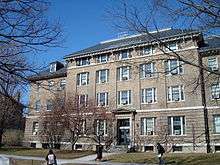Cornell Institute for Public Affairs
| Type | Private |
|---|---|
| Established | 1984 |
| Director | Sharon Tennyson |
| Location |
Ithaca, New York, U.S. 42°26′57″N 76°28′42″W / 42.4492°N 76.478276°W |
| Website |
www |
The Cornell Institute for Public Affairs (also known as CIPA) is a two-year, interdisciplinary Master of Public Administration (MPA) program at Cornell University.[1] CIPA is part of the College of Human Ecology, Cornell University Graduate School.[2] CIPA MPA candidates are classified as Fellows.[3]
History and Facts

Though an MPA degree has been offered at Cornell since 1946 (originally through the School of Business & Public Administration), the CIPA program was established as a stand alone entity in 1984.[4] CIPA currently has 14 core faculty and 104 field faculty members.[5] [6] The program has an average total enrollment of around 240 students with roughly 50% of the class consisting of students from outside of the United States.[7] Currently, CIPA has 1,187 alumni.[8]
Academics
CIPA Fellows design individualized plans of study based upon academic and professional interests and take courses from throughout the university.[9]
CIPA Curriculum
CIPA Fellows complete three foundation courses in each of the following subject areas: Administrative, Political and Policy Processes, Economic Analysis and Public Finance, and Quantitative Analysis.[10] CIPA offers eight areas of concentration from which to choose and students take five courses in their chosen concentration:[11]
- Economic and Financial Policy
- Environmental Policy
- Government, Politics, and Policy Studies
- Human Rights and Social Justice
- International Development Studies
- Public and Nonprofit Management
- Science, Technology, and Infrastructure Policy
- Social Policy
Practical Experience Requirement
Experiential learning is an integral component of the CIPA program. It serves as a practical complement to formal academic study. Students are expected to gain practical work experience in an area related to their concentration. There are several options for meeting this requirement. These can include an internship in the summer after their first year of study, off-campus study, or the Public Service Exchange course offered on-campus.[12]
Professional Writing/Analysis Qualification
As a culmination of the MPA program, students must demonstrate their high-level skills for writing and analysis by producing a professional writing project. There are three options for fulfilling this degree requirement:[13]
- Capstone Course
- Professional Project Report
- Formal Thesis
Off-Campus study opportunities
CIPA offers its MPA candidates numerous opportunities to study off-campus. These include:
- CIPA Washington Externship Semester
- New York City Externship Semester
- Cornell-Nepal Studies Program
- Cornell in Rome Program
- SVYM Mysore, India Externship Semester
Fellows are limited to one off-campus study semester.[14]
Rankings
For 2012, CIPA was ranked #37 overall by U.S. News & World Report. In specialty areas, CIPA ranked #24 in Public Policy Analysis.[15]
Publications
CIPA graduate students produce the online publication, The Cornell Policy Review, an academic journal focused on issues surrounding the field of public policy
Student life
CIPA fosters a vibrant and active student community. Students come from around the globe and represent widely varied fields of interests, endeavors, and experiences. CIPA has a long-standing reputation for fostering a culture of collaboration, openness, and genuine support and respect among students and faculty alike. While pursuing their M.P.A., Fellows engage in a variety of co-curricular activities ranging from academic to purely social.
Co-curricular activities
Official student operated co-curricular activities at CIPA currently include:
- The Cornell Public Affairs Society (CPAS)
- The Cornell Policy Review
- Women in Public Policy (WIPP)
- Cornell Latin America Student Society
- Cornell International City/County Management Association (cICMA)
- CIPA-New Orleans Professional Partnership (CIPA-NOLA)
- International Affairs Forum
Campus

Though not associated with the Cornell University College of Agriculture and Life Sciences, the CIPA program is headquartered on the university's Ag Quad in Caldwell Hall. Caldwell is a historic building and the oldest on the Ag Quad. It is a Colonial Revival structure constructed in 1913.[16]
References
- ↑ "The Cornell Institute of Public Affairs".
- ↑ "Cornell University Graduate Degrees".
- ↑ "The Cornell Institute for Public Affairs".
- ↑ "CIPA History and Facts".
- ↑ "CIPA Core Faculty".
- ↑ "CIPA History and Facts".
- ↑ "CIPA History and Facts".
- ↑ "CIPA History and Facts".
- ↑ "CIPA Course Guide" (PDF).
- ↑ "CIPA Course Guide" (PDF).
- ↑ "CIPA: Academics".
- ↑ "CIPA Course Guide" (PDF).
- ↑ "CIPA Course Guide" (PDF).
- ↑ "CIPA Course Guide" (PDF).
- ↑ "US News, CIPA".
- ↑ "Caldwell Hall".